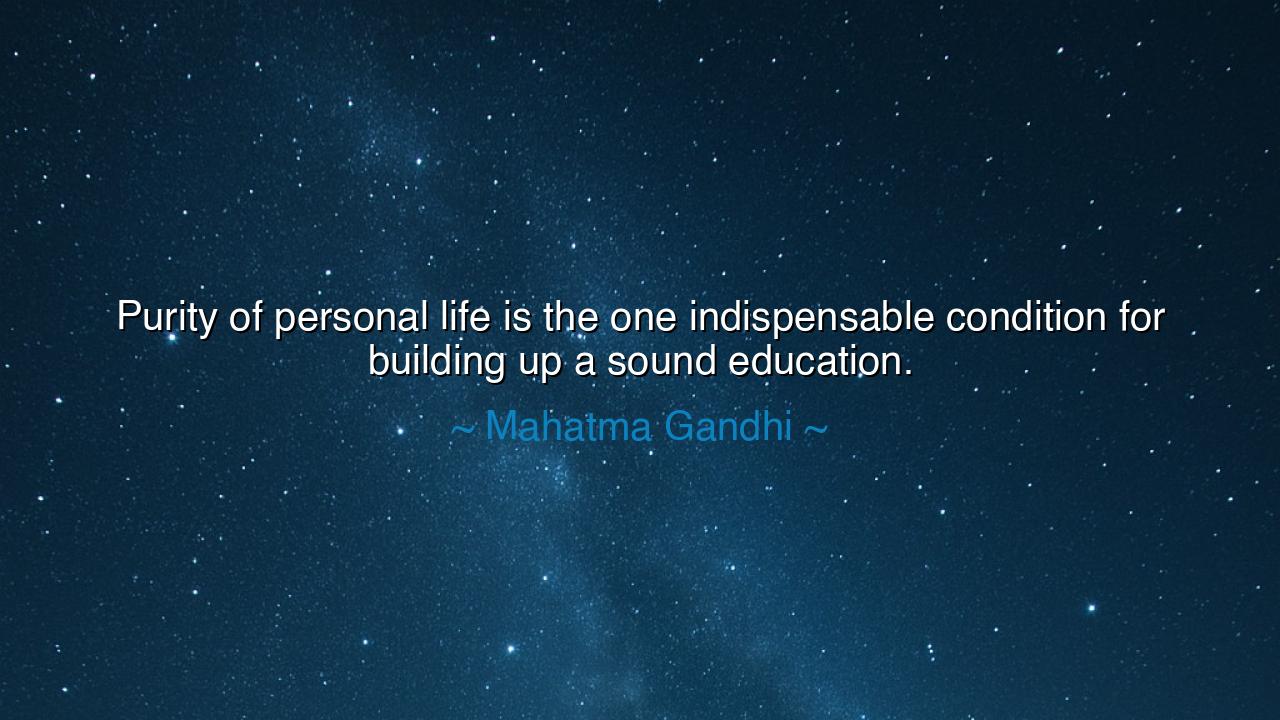
Purity of personal life is the one indispensable condition for
Purity of personal life is the one indispensable condition for building up a sound education.






Hear, O children of truth, the solemn wisdom of Mahatma Gandhi, who declared: “Purity of personal life is the one indispensable condition for building up a sound education.” In these words, he lifts learning beyond books and examinations, beyond lectures and classrooms, into the very heart of moral living. For Gandhi knew that knowledge without purity becomes corruption, that wisdom without integrity becomes manipulation, and that no true education can endure unless it rests upon the foundation of a righteous life.
What is meant by purity of personal life? It is not merely abstinence or ritual, but the harmony of thought, word, and deed. It is honesty in dealings, humility in triumph, compassion in power, and self-control in desire. A teacher who preaches truth but lives in falsehood, a scholar who speaks of justice but exploits others, may possess cleverness but not wisdom. Gandhi reminds us that the worth of education is measured not only by what one knows, but by how one lives.
Consider the life of Gandhi himself. He was trained in law, schooled in Western thought, and exposed to the grandeur of books and institutions. Yet he recognized that mere learning could not free his people. It was his own purity of life—his choice of simplicity, his refusal of violence, his practice of truth—that became his greatest education and his greatest teaching. Through his example, he instructed millions without a single textbook, proving that the character of the teacher is the first lesson of the student.
History echoes this truth in the story of Socrates. He taught not from written scrolls, but by the witness of his life, lived in fearless pursuit of truth. When accused and condemned, he accepted death rather than betray his conscience. In his personal purity, he showed his disciples that the soul’s integrity was higher than the body’s survival. Thus, his very life became the curriculum, and his death the final examination. His legacy endures, for it was rooted in purity.
Gandhi’s words also speak to the danger of our age. Too often, education is pursued as a means to power, to wealth, to status. Knowledge becomes a weapon for exploitation rather than a tool for service. When personal life is corrupted—when greed, dishonesty, or selfishness rule—then the fruits of education spoil. What use is a brilliant mind if it destroys trust? What use is progress if it corrodes the soul? Without purity, even the greatest learning becomes poison.
The meaning of Gandhi’s teaching is therefore both simple and profound: that the foundation of education is not information but character. A sound system of learning cannot be built on hypocrisy. A nation cannot be uplifted by schools that produce clever liars or cunning exploiters. True education begins with the self, with discipline, with inner cleansing. Only then can knowledge serve humanity instead of enslaving it.
Therefore, O seekers of wisdom, let this be your charge: cultivate purity of personal life as the soil in which your learning may grow. Practice honesty in small things, compassion in daily dealings, humility in success, and courage in truth. Let your education be not only in books but in virtue, not only in words but in deeds. In this way, your life itself will be the greatest lesson you teach, and the greatest inheritance you pass on.
The final word is this: as Gandhi has spoken, so must we remember. Purity of personal life is not an ornament to education, but its very foundation. Without it, knowledge is empty; with it, knowledge becomes power for good. Strive, then, not only to be learned, but to be pure. For in the union of wisdom and purity lies the path to a truly sound education, and in that path, the hope of humanity.






AAdministratorAdministrator
Welcome, honored guests. Please leave a comment, we will respond soon